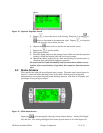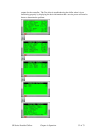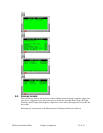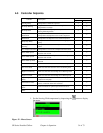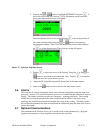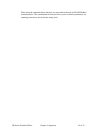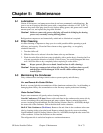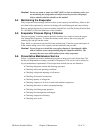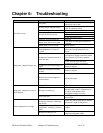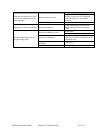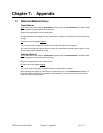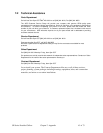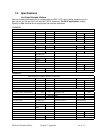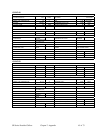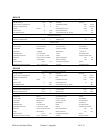GP Series Portable Chillers Chapter 5: Maintenance 39 of 73
Caution! Do not use steam or water over 140ºF (60ºC) to clean a condenser unless you
are monitoring the refrigeration circuit for excessive pressure with gauges.
Only a trained technician should use this method.
5-4 Maintaining the Evaporator
Dirty evaporator heat exchange surfaces reduce system capacity and efficiency. Remove dirt
and slime in the evaporator by reverse-circulating with a mild detergent and water solution.
Remove mineral deposits by reverse-circulating Liquid Citric Acid De-Scaling Solution (Part
No. A0536607). Follow the directions on the container.
5-5 Evaporator Process Piping Y-Strainer
The process piping Y-strainer requires periodic cleaning of its screen to insure the proper
flow through the evaporator. To clean the strainer screen, remove the access plug and
retaining cap, and pull out the screen.
Wipe, brush, or vacuum out any dirt left in the strainer body. Clean the screen and replace it
in the strainer taking care to fit it squarely into the machined seat provided.
Caution! Do not forget to re-install the screen after cleaning it. Operating the chiller
with no strainer screen can potentially plug the evaporator with dirt. The
warranty does not cover chiller failures from a dirty evaporator.
5-6 Preventative Maintenance Service
Follow a systematic preventive maintenance program to help avoid costly down time. Call
the Service Department to arrange a schedule of inspections. This service can be tailored to
fit your maintenance requirements. These inspections include, but are not limited to:
• Checking refrigerant suction and discharge pressures
• Checking safety and operating conditions
• Checking voltage and amperage of all motors
• Checking all electrical connections
• Checking quantity of refrigerant
• Checking compressor oil level on units with tandem compressors
• Checking lubrication of motor and pump bearings
• Checking circulating pump operation
• Checking flow through heat exchangers
• Checking compressor efficiency
• Checking noise levels



